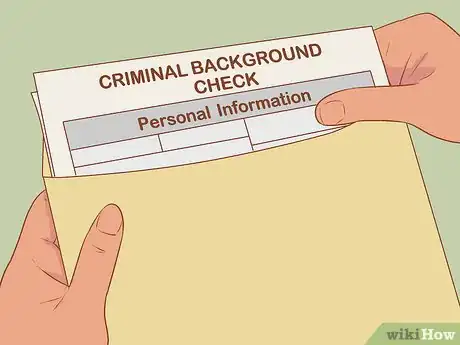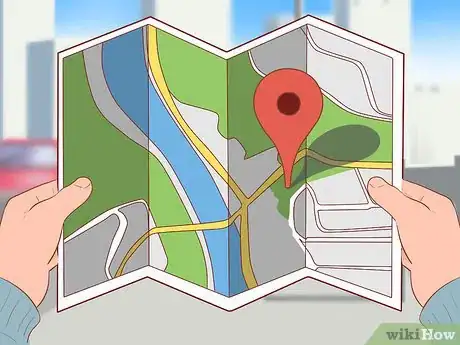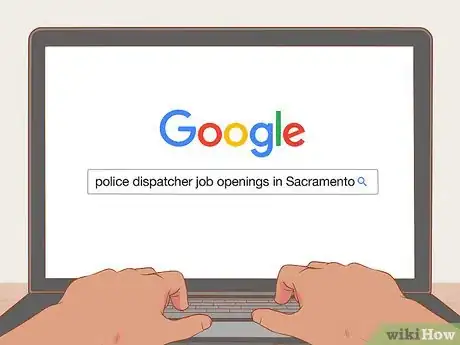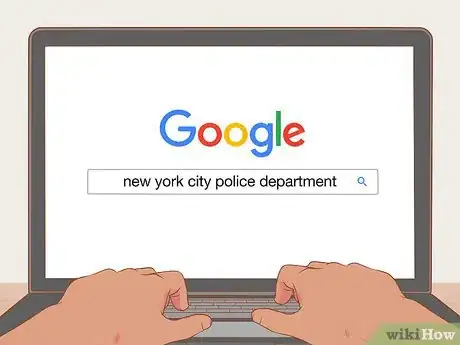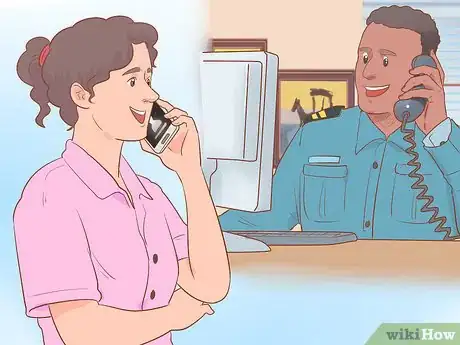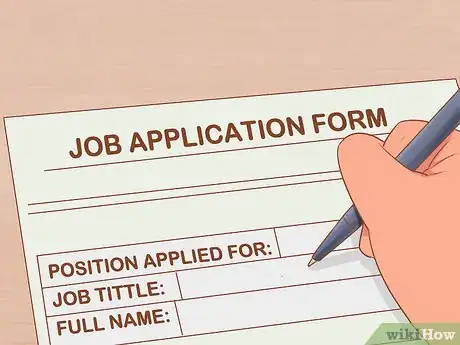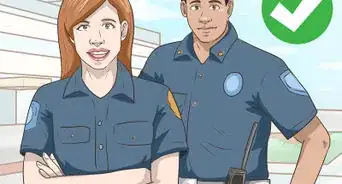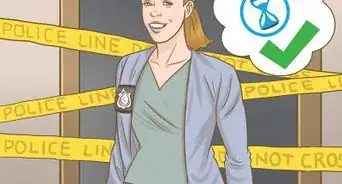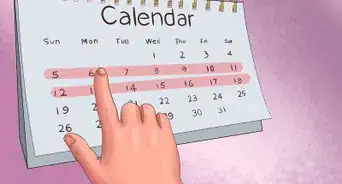This article was co-authored by Luigi Oppido. Luigi Oppido is the Owner and Operator of Pleasure Point Computers in Santa Cruz, California. Luigi has over 25 years of experience in general computer repair, data recovery, virus removal, and upgrades. He is also the host of the Computer Man Show! broadcasted on KSQD covering central California for over two years.
This article has been viewed 83,366 times.
Police dispatchers need to be calm under pressure, able to manage both emergency and non-emergency phone calls, and have a desire to help the public. This position requires that individuals can quickly assess and respond to a situation, have strong communication and listening skills, and the ability to elicit information from distressed callers. The job requires education, training and sometimes prior work experience. If you are interested in becoming a police dispatcher, this article provides you information on how to pursue this career.
Steps
Meeting the General Job Requirements
-
1Earn a high school diploma. Almost every police dispatcher position requires that you have a high school diploma or a GED certificate. These positions also require that you are at least 18 years old. If you have not yet graduated from high school or you are pursing your GED, you must successfully complete one of these programs in order to be considered for a dispatcher position.[1]
-
2Maintain a clear criminal record. Most dispatcher jobs require that you pass a criminal background check and in some cases, may require that you pass a lie detector test. If you were arrested for a minor offense, this may not prevent you from becoming a police dispatcher. As discussed below, once you have identified an open position, you can determine whether you meet the specific requirements for that position.Advertisement
-
3Develop basic typing skills. Police dispatchers are required to type information quickly and accurately. Most police dispatcher positions will require you to demonstrate basic typing skills, such as speed and accuracy as part of the application process. In preparation, you should practice typing until you are able to type 35 words per minute with 90% accuracy. [2]
- Typing.com and Speed Typing Online are some of the free websites online you can use to practice typing skills and to check your accuracy and typing speed.
- To improve your typing speed, experts suggest using ergonomic keyboards.
-
4Familiarize yourself with local geography. Police dispatchers must be knowledgeable about their local geography in order to properly assess and assign emergency response personnel, as well as identify the location of callers. If you know the location where you want to work, study maps of the local area, learn the names of neighborhoods and gain an understanding of the basic layout of your location, including any major landmarks.
Identifying Job Opportunities
-
1Search online job sites for police dispatcher positions. Some police departments post employment opportunities for police dispatchers on large, commercial job sites in order to attract the largest applicant pool. A simple way to begin your online job search is to perform an internet search that includes language such as, police dispatcher job openings and that also includes the geographic region that you are interested in working. For example, “police dispatcher job openings in Sacramento, CA.” This basic search may direct you to job postings on large job sites.
-
2Search the internet for police department, city, or town websites where you are interested in working. If online job sites did not capture employment opportunities in your preferred work location, you should determine if police departments or municipalities where you are interested in working maintain their own websites. These websites may list employment opportunities, job descriptions, job requirements and salary.
-
3Call police departments, if you were unable to locate employment openings online. Increasingly, police departments and municipalities provide employment opportunities online. If you are unable to locate this information, call the relevant police departments’ non-emergency phone number. Inquire whether there are any job openings for police dispatchers and ask about the job requirements. While jobs may vary, many police dispatcher positions will require the following:[3]
- obtain a high school diploma or GED certificate
- basic typing skills
- pass a written exam
- pass a criminal background check
- speak English or other languages
- pass a vision and hearing test
- pass a drug test [4]
Applying for Police Dispatcher Position
-
1Request and fill out a job application. Once you have identified a job opening and meet the minimum job requirements, either download the application from the police department, city or town website, request an application by mail, or pick it up in person. Typically, job applications will require contact information, background information (education, work history, references), and may ask you about any criminal convictions. It is essential that you answer all of the questions truthfully.
-
2Prepare for the police dispatcher exam. Ask your local police department if they provide a study guide for the exam. Some governmental websites also provide free, downloadable study guides. In preparation for the exam:
- read through the study guide
- familiarize yourself with the exam format and types of questions
- practice answering the questions
-
3Take the police dispatcher exam. Most likely, the police department will ask you to take a written exam, as well as other tests, such as a typing test. [5] On the day of the exam you should:
- arrive on time for your scheduled exam and carefully read all of the exam instructions
- determine whether the instructions set forth how points are calculated
- consider skipping questions that you can’t answer if the exam penalizes for incorrect answers
- consider answering all of the questions if the exam only awards points for correct answers
- be mindful that you are answering questions quickly enough to finish the test within the allotted time
-
4Prepare for your job interview. If you meet the basic job requirements and scored satisfactorily on the exam, the police department may schedule you for an in-person job interview. The interview allows employers to assess how well you are able to answer questions, respond to hypothetical emergency situations, and judge whether your demeanor fits well within the office and for the job. Before the interview,
- study the job requirements,
- review your exam study information
- practice answering interview questions based on your study material
- be able to clearly articulate why you are interested in the job
-
5Attend your scheduled job interview. On the day of the interview: arrive five to ten minutes before your scheduled interview, dress in professional attire, and be enthusiastic and confident. Tell the interviewers why you are interested in the position, discuss your qualifications and your desire to be trained as a police dispatcher.
-
6Accept the position. If you are offered a position you may have the opportunity to negotiate your salary. The average salary for police dispatchers is approximately $36,300.[6]
- If your job offer is within this salary range, you may still consider negotiating for a higher salary.
- If they are not willing to raise the salary, ask the employer to specify the amount and type of job training and certifications. While you may not have a higher salary to start, completed training and certifications may put you in a better position to renegotiate your salary at a later date or seek employment elsewhere as a trained, certified and experienced police dispatcher.
Community Q&A
-
QuestionWhere can I find practice tests?
 Community AnswerThere are mock exams on Quizlet. Search for: 911 Public Safety Telecommunicators State Exam Study Guide- Mock Exams.
Community AnswerThere are mock exams on Quizlet. Search for: 911 Public Safety Telecommunicators State Exam Study Guide- Mock Exams. -
QuestionDo I need to be a U.S. resident to work as a police dispatcher?
 Community AnswerYou need to be a resident or have a valid VISA.
Community AnswerYou need to be a resident or have a valid VISA. -
QuestionWould taking a criminal justice class increase my chances of becoming a dispatcher?
 Community AnswerYes, it is possible. Earning a degree will be especially helpful.
Community AnswerYes, it is possible. Earning a degree will be especially helpful.
References
- ↑ https://www.miamidade.gov/global/police/careers-police-dispatcher.page
- ↑ https://www.publicsafetytesting.com/information-center/test-requirements-dispatch-testday
- ↑ https://www.criminaljusticedegreeschools.com/criminal-justice-careers/fire-and-police-dispatch/
- ↑ http://www.bls.gov/ooh/office-and-administrative-support/police-fire-and-ambulance-dispatchers.htm#tab-4\
- ↑ http://www.bls.gov/ooh/office-and-administrative-support/police-fire-and-ambulance-dispatchers.htm#tab-4\
- ↑ http://www.bls.gov/ooh/office-and-administrative-support/police-fire-and-ambulance-dispatchers.htm#tab-5
About This Article
To become a police dispatcher, start by earning a high school diploma or a GED certificate since most police departments require this for dispatcher positions. Next, work on related skills such as increasing your typing speed and familiarizing yourself with local geography. Then, apply for open dispatcher positions in your area and take the dispatcher exam. Once you pass the dispatcher exam, the police department will contact you for a job interview! For tips on studying for the dispatcher exam, read on!

